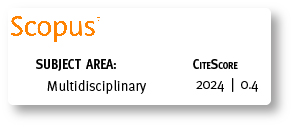International students at the University of Cuenca: A study of their needs and perceptions
DOI:
https://doi.org/10.18537/mskn.06.02.05Keywords:
Cuenca, Ecuador, higher education, incoming exchange students' opinions, international student exchange programs, toursim servicesAbstract
This manuscript discusses a study that was conducted among incoming international exchange students at the University of Cuenca, Ecuador in the period 2011-2013. Its focus was not on the students’ educational experiences, but rather on their opinions about the tourism services that were provided and on their travel preferences. Several comparative analyses of the opinions of males vs. females and of Latin American students vs. European/US students found significant differences of opinion regarding the various experiences. The manuscript makes a contribution to the literature in its focus on the students’ perceptions about tourism services in Ecuador and on their travel behaviors. It offers practical recommendations for university administrators, tourism executives and policy makers as they try to enhance the country’s tourism offerings and to improve Ecuador’s image as a safe, well-developed tourism destination and as a welcoming site for international exchange students.
Downloads
Metrics
References
Altbach, P., J. Knight, 2007.The globalization of international education. J. Stud. Int. Educ., 11(3-4), 290-305.
Altbach, P., U. Teichler, 2001. Internationalization and exchanges in a globalized university. J. Stud. Int. Educ., 5(1), 5-25.
Arndt, R.T., 1984. Rethinking international education. In: Olson, W.C., L.D. Howell (Eds.). International Education: The Unfinished Agenda (pp. 1-39). Indianapolis, IN: White River Press, Inc.
Barnett, G.A., R.Y. Wu, 1995. The international student exchange network: 1970 & 1989. High. Educ., 30, 353-368.
Brunner, J., 2009. The Bologna Process from a Latin American Perspective. J. Stud. Int. Educ., 1-22.
Calleja, J., 1995. International education: A common direction for our future. In: Calleja, J. (Ed.). International Education and the University (pp. 41-57). Bristol, PA and London: Jessica Kingsley Publishers.
Carlson, J., K. Widaman, 1988. The effects of study abroad during college on attitudes toward other cultures. IJIR, 12(1), 1-17.
Carrera, P., 2010. Diseño del sistema académico por competencias de la Escuela de Turismo y Hospitalidad de la Pontificia Universidad Católica del Ecuador. Gestión Turística (Valdivia), 13, 93-112.
Chieffo, L., L. Griffiths, 2004. Large-scale assessment of student attitudes after a short-term study abroad program. Frontiers: The Interdisciplinary Journal of Study Abroad, 10(10), 165-177.
Couper, M.P., 2000.Web Surveys: A review of issues and approaches. POQ, 64(4), 464-494.
Daly, A., M. Barker, 2010. Australian universities’ strategic goals of student exchange and participation rates in outbound exchange programmes. J. High. Educ. Pol. Manag., 32(4), 333-342.
Doyle, S., P. Gendall, J. Hoek, C. Tait, L. McKenzie, 2010. Investigation of factors associated with student participation in study abroad. J. Stud. Int. Educ., 14(5), 471-490.
Drews, D., Meyer, L., Peregrine, P., 1996. Effects of study abroad on conceptualizations of national groups. Coll. Stud. J., 30, 452-461.
Fernández, C., P. Zaldívar, F. Enríquez, 2013. Turismo alternativo y educación: Una propuesta para contribuir al desarrollo humano. El Periplo Sustentable: Revista de Turismo, Desarrollo y Competitividad, 24, 125-154.
Frisch, N.C., 1990. An international nursing student exchange program: An educational experience that enhanced student cognitive development. J. Nurs. Educ., 29(1), 10-12.
Gacel Avila, J., 2007. The process of internationalization of Latin American higher education. J. Stud. Int. Educ., 11(3-4), 400-409.
Hadis, B., 2005. Why are they better students when they come back? Determinants of Academic Focusing Gains in the Study Abroad Experience. Frontiers: The Interdisciplinary Journal of Study Abroad, 11, 57-70.
Juvan, E., M. Lesjak, 2011. Erasmus Exchange Program: Opportunity for professional growth or sponsored vacations? J. Hosp. Tour. Educ., 23(2), 23-29.
Lamey, S.L., 1990. Global education: A conflict of images. In: Tye, K.A. (Ed.). Global Education: From Thought to Action (pp. 49-66). Alexandria, VA: Association for Supervision and Curriculum Development.
Lawson, D., D.S. White, S. Dimitriadis, 1998. International business education and technology-based active learning: Student-reported benefit evaluations. J. Market. Educ., 20(2), 141-148.
Lopez, D., D. Lopez, L. Andrade, B. Lopez, 2011. Functional patterns in international organizations for University Cooperation in Latin America and the Caribbean. J. Stud. Int. Educ., 15(2), 203-215.
Messer, D., S. Wolter, 2001. Are student exchange programs worth it? QHE, 7(3), 647-663.
Mohareji, E., J. Gillespie, 2003. How study abroad shapes global careers: Evidence from the United States. J. Stud. Int. Educ., 25(1), 43-70.
Mutlu, S., 2011. Development of European consciousness in Erasmus students. J. Cult. Soc., 2/2011, 87-102.
Paige, R., G. Fry, E. Stallman, J. Josic, J. Jon, 2009. Study abroad for global engagement: the long-term impact of mobility experiences. Intercultur. Educ., 20(1), S29-S44.
Palese, A., A. Zabalegui, A. Sigurdadottir, M. Bergin, B. Dobrowolska, C. Gasser, M. Pajnkihar, C. Jackson, 2014. Bologna Process, More or Less: Nursing education in the European Economic Area: A Discussion Paper. Int. J. Nurs. Educ. Scholarsh., 11(1), 63-73.
Pechar, H., 2007. The Bologna Process: A European Response to Global Competition in Higher Education. CJHE, 37(3), 109-125.
Remy, R.C., J.A. Nathan, J.M. Becker, J.V. Torney, 1975. International learning and international education in a global age. Washington, D.C.: National Council for the Social Studies.
Roberts, E.H., 1998. The innocents abroad. Do students face international internships unprepared? CHRAQ, 39(4), 64-69.
Rodriguez-Gonzalez, C., R. Bustillo Mesanza, P. Mariel, 2011. The determinants of international student mobility flows: an empirical study on the Erasmus program. High. Educ., 62(4), 413-430.
Saliba, M. (1995).An institutional framework for international education.In J. Calleja (Ed.), International Education and the University (pp. 58-80). Bristol, PA and London: Jessica Kingsley Publishers.
Schaefer, D.R., D.A. Dillman, 1998. Development of standard e-mail methodology: Results of an experiment. POQ, 62(3), 378-397.
Schonland, A.M., P.W. Williams, 1996.Using the Internet for travel and tourism survey research: Experiences from the Net traveler survey. J. Travel Res., 35(2), 81-87.
Silberleib, N., 2005. El turismoeducativo y surelación con las políticas culturales de Buenos Aires. Turismo Cultural, 81.
Souto-Otero, M., J. Huisman, M. Beerkens, H. De Wit, S. Vujic, 2013. Barriers to international student mobility: Evidence from the Erasmus program. Educ. Res., 42(2), 70-77.
Stangor, C., K. Jonas, W. Stroebe, M. Hewstone, 1994. Influence of student exchange on national stereotypes, attitudes, and perceived group variability. Eur. J. Soc. Psychol., 26, 663-675.
Stone, M., J. Petrick, 2014. The educational benefits of travel experiences: A literature review. J. Travel Res., 52(6), 731-744.
Sutton, R., D. Rubin, 2004. The glossary project: Initial findings from a system-wide search initiative on study abroad learning outcomes. Frontiers, 10(4), 65-82.
Swanson, G.I., 1969. International education: Portents for the future. In: Paulsen, F.R. (Ed.), Changing dimensions in International education (pp. 1-8). Tucson, AZ.: The University of Arizona Press.
Tse, A.C., 1998. Comparing the response rate, speed and response quality of two methods of
sending questionnaires: E-mail vs. mail. JMRS, 40(4), 353-361.
Vestal, T.M., 1994. International education: Its history and promise for today. London: Praeger Publishers.
Van der Wende, M., D. Westerheijden, 2010. International aspects of quality assurance with a special focus on European higher education. QHE., 7(3), 223-245.
Van Hoof, H., 2006. Searching for the holy grail of international education: Feedback from hospitality management study abroad participants. FIU Hospitality Rev., 24(1), 49-59.
Van Hoof, H., M.J. Verbeeten, 2005. Wine is for drinking, water is for washing. Student perceptions about international exchange programs. J. Stud. Int. Educ., 9(1), 42-61.
Downloads
Published
How to Cite
Issue
Section
License
Copyright © Autors. Creative Commons Attribution 4.0 License. for any article submitted from 6 June 2017 onwards. For manuscripts submitted before, the CC BY 3.0 License was used.
![]()
You are free to:
 |
Share — copy and redistribute the material in any medium or format |
 |
Adapt — remix, transform, and build upon the material for any purpose, even commercially. |
Under the following conditions:
 |
Attribution — You must give appropriate credit, provide a link to the licence, and indicate if changes were made. You may do so in any reasonable manner, but not in any way that suggests the licenser endorses you or your use. |
| No additional restrictions — You may not apply legal terms or technological measures that legally restrict others from doing anything the licence permits. |









